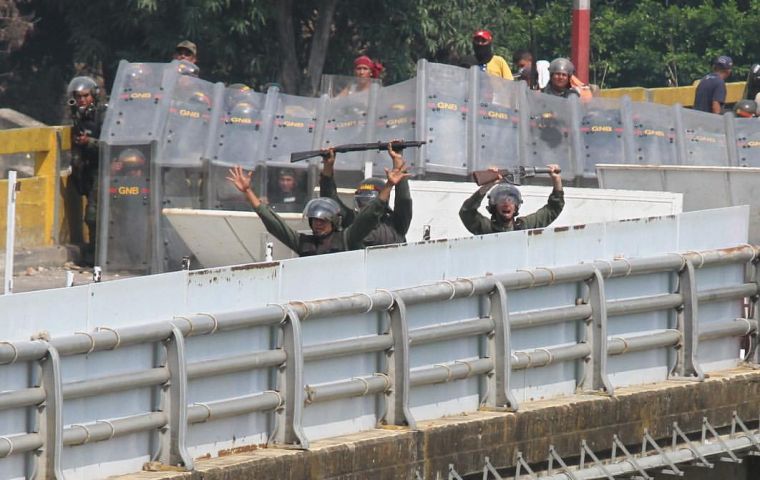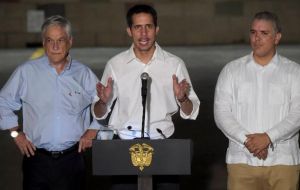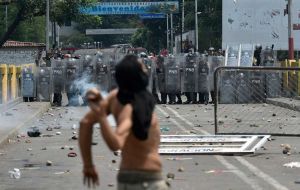MercoPress. South Atlantic News Agency
Venezuela soldiers who defected to Colombia fear for their families
 More than 100 soldiers are said to have defected, most during deadly clashes over aid deliveries on Saturday. (Rafael Hernández)
More than 100 soldiers are said to have defected, most during deadly clashes over aid deliveries on Saturday. (Rafael Hernández)  Guaido will attend this Monday a meeting of the Lima Group, despite being under a travel ban imposed by Maduro. Vice-President Mike Pence will represent US
Guaido will attend this Monday a meeting of the Lima Group, despite being under a travel ban imposed by Maduro. Vice-President Mike Pence will represent US  At various crossing points, Venezuelan security forces fired tear gas at volunteers and protesters burning outposts and throwing stones at soldiers and riot police.
At various crossing points, Venezuelan security forces fired tear gas at volunteers and protesters burning outposts and throwing stones at soldiers and riot police. Venezuelan soldiers who defected into Colombia on Saturday say they fear for the safety of their families under President Nicolás Maduro's government. Speaking exclusively to the BBC's Orla Guerin, one defector aged 23 says he is worried forces loyal to the president may “lash out against my family”.
“But I think it was the best decision I could have made,” he adds.
More than 100 soldiers are said to have defected, most during deadly clashes over aid deliveries on Saturday.
Tensions were high after President Maduro sent troops to block roads and bridges at the borders of neighboring Brazil and Colombia, where food and medicine deliveries, organized by the US, were set to enter the country.
At various crossing points, Venezuelan security forces fired tear gas at volunteers and protesters burning outposts and throwing stones at soldiers and riot police.
After agreeing to speak with the BBC on condition of anonymity, a group of Venezuelan deserters based in a church in Cúcuta described what pushed them to leave President Maduro's armed forces.
“There are many professional troops who want to do this. This will be a domino effect. This will have significant influence on the armed forces,” one 29-year-old man said.
“The armed forces have broken down because of so many corrupt officers. The professional military is tired. We cannot remain slaves, we are freeing ourselves,” he added.
Another defector, a woman, described the mood on Saturday as “tense”, adding: “I was thinking I could not harm my own people. My daughter is still in Venezuela and that is what hurts the most.
But I did this for her. It's difficult because I don't know what they might do to her.”
A third said he felt pain at seeing the Venezuelan people on the streets fighting for humanitarian aid. “I felt impotent and useless. I felt pain for everything happening,” he said.
On Sunday, US Secretary of State Mike Pompeo said President Maduro's “days are numbered” following the deadly events at the weekend.
“Picking exact days is difficult. I'm confident that the Venezuelan people will ensure that Maduro's days are numbered,” Mr Pompeo told CNN.
At least four people died in Saturday's clashes between civilians and troops loyal to Mr Maduro.
Declared interim President Juan Guaidó, who has been recognized by more than 50 countries, has called on other nations to consider “all measures” to oust Mr Maduro after opposition-led efforts to bring in aid descended into clashes.
He also said he would attend a meeting of the Lima Group, mostly Latin American countries in Colombia on Monday, despite being under a travel ban imposed by Mr Maduro. US Vice-President
Mike Pence will represent Washington at the talks in Bogota.
Meanwhile, Colombia and Brazil said they would intensify pressure on Mr Maduro to relinquish power. US President Donald Trump has not ruled out an armed response to the Venezuela crisis.
Separately on Sunday, a boat carrying US aid from Puerto Rico to Venezuela was forced to dock on the small Dutch island of Curaçao after it was intercepted by the Venezuelan navy off the northern coast. The vessel was reportedly loaded with nine cargo containers filled with food and medicine.
Maduro, who says he is the legitimate president and is backed by key economic allies including Russia, Cuba and China, has warned that deliveries of foreign aid would open the way for US military intervention.
Mr Guaidó, declared interim president last month, argues that alleged irregularities with the nation's 2018 election render Mr Maduro's leadership illegitimate.
Venezuela's opposition had intended to peacefully bring aid trucks over the borders with Brazil and Colombia. Guaidó had pledged that the aid would come into the country on Saturday. In response, Mr Maduro partly closed the country's borders.
Venezuelan civilians attempted to cross in order to get to the stores of food and medicine, but the attempt quickly descended into bloody violence. Soldiers and armed Maduro thugs opened fire on civilians, using a mixture of live ammunition and rubber bullets.




Top Comments
Disclaimer & comment rulesCommenting for this story is now closed.
If you have a Facebook account, become a fan and comment on our Facebook Page!